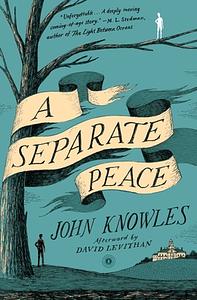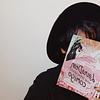You need to sign in or sign up before continuing.
Take a photo of a barcode or cover
relaxing
sad
medium-paced
Plot or Character Driven:
A mix
Strong character development:
Yes
Loveable characters:
No
Diverse cast of characters:
Complicated
Flaws of characters a main focus:
Complicated
What an interesting book! I was drawn to [b:A Separate Peace|5148|A Separate Peace|John Knowles|https://i.gr-assets.com/images/S/compressed.photo.goodreads.com/books/1528860889l/5148._SY75_.jpg|39755] due to the back cover stating that [a:John Knowles|3496|John Knowles|https://images.gr-assets.com/authors/1201185977p2/3496.jpg] explored innocence and evil, finding what the two truly meant. While the book was too expensive to buy new from a bookstore, I checked it out from my public library and was not disappointed. Prior to a month ago, I had never heard of the book before.
Similar to what Gene experienced, Finny was undoubtedly what brought the story to life...portions of the book where he melted into the background left the book feeling grey and lifeless.
The relationship between Gene and Finny is fascinating, and unlike anything I've seen portrayed in literature before. It's complex, not-what-meets-the-eye, and tainted. Time and time again I was shocked by the depths and motivations of each character.
The first fifty pages and last fifty pages were the most interesting. I found myself "pushing through" in the middle portions of the novel--I was so invested in Finny and didn't care much for Gene on his own, which play into Gene's fears entirely. Finny is the more interesting, likable, successful, and charmed one between them, despite Gene's best efforts to level the playing field and Gene knows this. That's what makes the book so interesting. Gene knows Finny is a better human than him and he grapples with this throughout the entire book, deciding if he wants to bring Finny down or better himself.
Never before have I seen good and evil explored in such a way, with such honesty and frankness without coming across as the "raw" and "real" work that seems to try so hard.
I think all adolescents should read this. I understand why it's a required book, and I wish I had read it as a younger teen in high school. I am now reading it for fun as a senior in college, and perhaps this is why I appreciated A Separate Peace so much. I'm old enough to have developed self-awareness about my own shortcomings, fears, and insecurities, and I learned how this affects my relationship both with my others and myself. More, I learned how to move past that, or at least where to head in the right direction, which is what Gene lacks. That's what sets this book apart from others. The main character is flawed in such a frustrating and unfortunately relatable way, though I'm sure many readers don't want to admit that.
My point is that perhaps high school is too young to experience this book and appreciate it. Maybe it serves better as an aid to one's reflection once they have spent some time away from high school, but I cannot say. I'm very curious about whether or not I would have enjoyed this in high-school.
I read another review saying that this book (set in WW2) is no longer relevant, and I strongly believe that is untrue. While sure, the specifics are not currently relevant, as there is no WW2 to enlist in, are teenagers in high school no longer taxed with the daunting decision of what to do with their futures in the next few years? Will they not be making life-changing choices, such as enlisting, enrolling into a college that might cripple their future selves in student loans, not enrolling into any higher education and risking that?
Do students not struggle with comparing themselves to others? With the nonstop question of life being fair, of some being dealt more favorable cards than others? Natural gifts/talents versus practiced skill? Affluent backgrounds versus humble backgrounds?
The themes, choices, questions, and decisions, in their bare bones, are still relevant to every single teenager in the U.S. today.
I think everyone should read it.
Similar to what Gene experienced, Finny was undoubtedly what brought the story to life...portions of the book where he melted into the background left the book feeling grey and lifeless.
The relationship between Gene and Finny is fascinating, and unlike anything I've seen portrayed in literature before. It's complex, not-what-meets-the-eye, and tainted. Time and time again I was shocked by the depths and motivations of each character.
The first fifty pages and last fifty pages were the most interesting. I found myself "pushing through" in the middle portions of the novel--I was so invested in Finny and didn't care much for Gene on his own, which play into Gene's fears entirely. Finny is the more interesting, likable, successful, and charmed one between them, despite Gene's best efforts to level the playing field and Gene knows this. That's what makes the book so interesting. Gene knows Finny is a better human than him and he grapples with this throughout the entire book, deciding if he wants to bring Finny down or better himself.
Never before have I seen good and evil explored in such a way, with such honesty and frankness without coming across as the "raw" and "real" work that seems to try so hard.
I think all adolescents should read this. I understand why it's a required book, and I wish I had read it as a younger teen in high school. I am now reading it for fun as a senior in college, and perhaps this is why I appreciated A Separate Peace so much. I'm old enough to have developed self-awareness about my own shortcomings, fears, and insecurities, and I learned how this affects my relationship both with my others and myself. More, I learned how to move past that, or at least where to head in the right direction, which is what Gene lacks. That's what sets this book apart from others. The main character is flawed in such a frustrating and unfortunately relatable way, though I'm sure many readers don't want to admit that.
My point is that perhaps high school is too young to experience this book and appreciate it. Maybe it serves better as an aid to one's reflection once they have spent some time away from high school, but I cannot say. I'm very curious about whether or not I would have enjoyed this in high-school.
I read another review saying that this book (set in WW2) is no longer relevant, and I strongly believe that is untrue. While sure, the specifics are not currently relevant, as there is no WW2 to enlist in, are teenagers in high school no longer taxed with the daunting decision of what to do with their futures in the next few years? Will they not be making life-changing choices, such as enlisting, enrolling into a college that might cripple their future selves in student loans, not enrolling into any higher education and risking that?
Do students not struggle with comparing themselves to others? With the nonstop question of life being fair, of some being dealt more favorable cards than others? Natural gifts/talents versus practiced skill? Affluent backgrounds versus humble backgrounds?
The themes, choices, questions, and decisions, in their bare bones, are still relevant to every single teenager in the U.S. today.
I think everyone should read it.
reflective
sad
fast-paced
Plot or Character Driven:
Character
Strong character development:
Yes
Loveable characters:
Yes
Diverse cast of characters:
No
Flaws of characters a main focus:
Yes
What saved this book from getting a 2 star or below is how it was able to get such an emotional reaction from me. I have never been felt so much anger while reading a book, especially from one assigned in english class. To be honest, I hated it. I hated the main character, Gene, and how he delt with his situation with Finny. I hated his actions, and how he just couldn't fucking say what was on his mind. I hated the jealousy and envy that consumed him, as I almost started to relate to him at some point until the tree incident. It was shocking, horrifying, and I felt nothing but anger and frustration for Gene. On the contrary, I loved Finny. Sure, he was a too good to be true character but his sincere and genuine personality just won me over. He deserved much more than he got for his ending, which is all I will say. The only part I really liked was the beach scene where Gene stared at Finny and the description was finally not boring crap and it just flowed so nicely together. Then of course, it goes downhill from there. I hated the rest, how it ended, and most of the characters were unlikable and a boring slate. However, I'm almost impressed on how much emotion this book was able to get out of me, so there must have been some good writing there. If I could, I would actually give this a 3.5. I don't know if I would recommend it for anyone, unless they like delusional angst and terribly upsetting books.
challenging
emotional
sad
The first time I read this, it was for school and I probably would have given it three stars rather than five. I didn't enjoy reading it and I didn't really get the undertones. Then I grew up a little and decided to give it another chance and loved it! I got a lot more out of it that time around and could see the beauty of the story and writing.
So, now I know why this gets assigned to every high schooler in America--because you can do some just brainless literary analysis on it.
A Separate Peace was such a journey for me. I read it as part of the english honors curriculum book, but I thought the conflict was amazingly captured. I did think that the character portrayal of Phineas was a bit unrealistic though. He was happy (or pretended to be all the time). I think that was odd...Nobody can always be cheerful
I first read this book in high school and enjoyed it -- this year was my second time reading it and I enjoyed it nearly as much now as then, and probably even more (aside from the couple instances of racist and ableist terminology -- where most of my one-star removal comes from). The complicated and contradictory feelings and actions of the narrator, Gene, are relatable and you'll find yourself both supporting or scoffing at him. I think a great capture of the complexity of adolescence and friendship.
emotional
sad
slow-paced
Plot or Character Driven:
Character
Strong character development:
No
Loveable characters:
Complicated
Flaws of characters a main focus:
Yes






